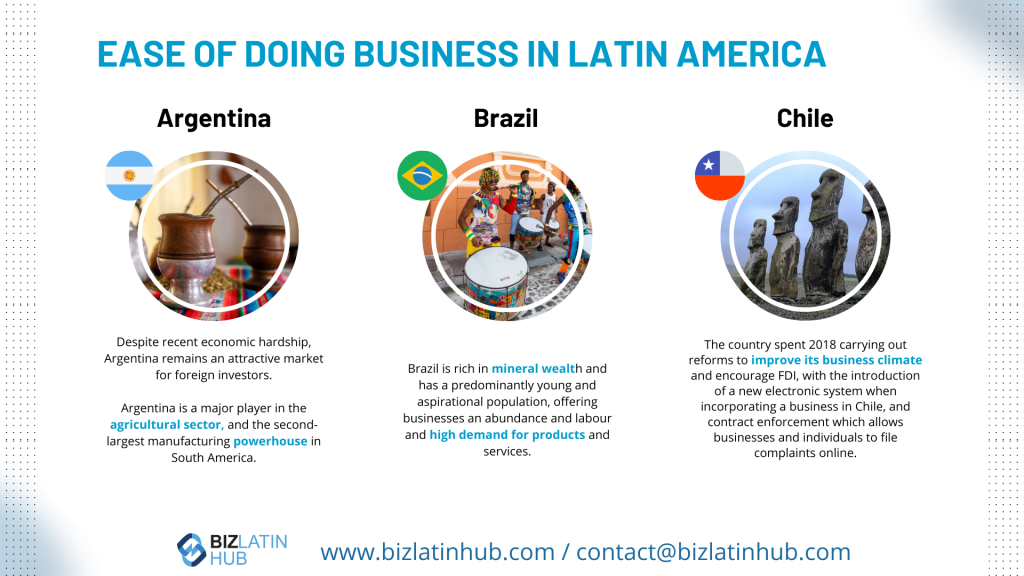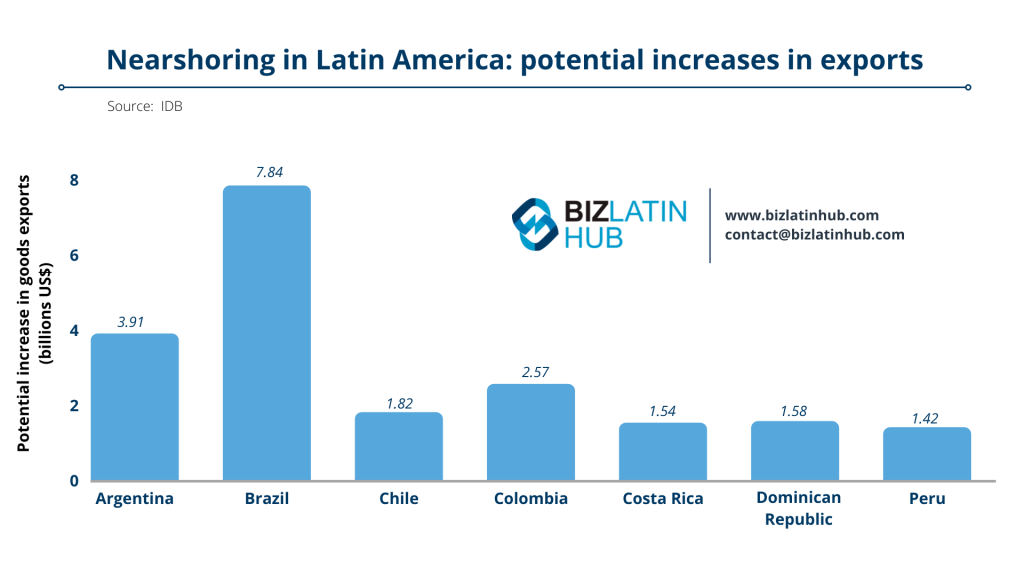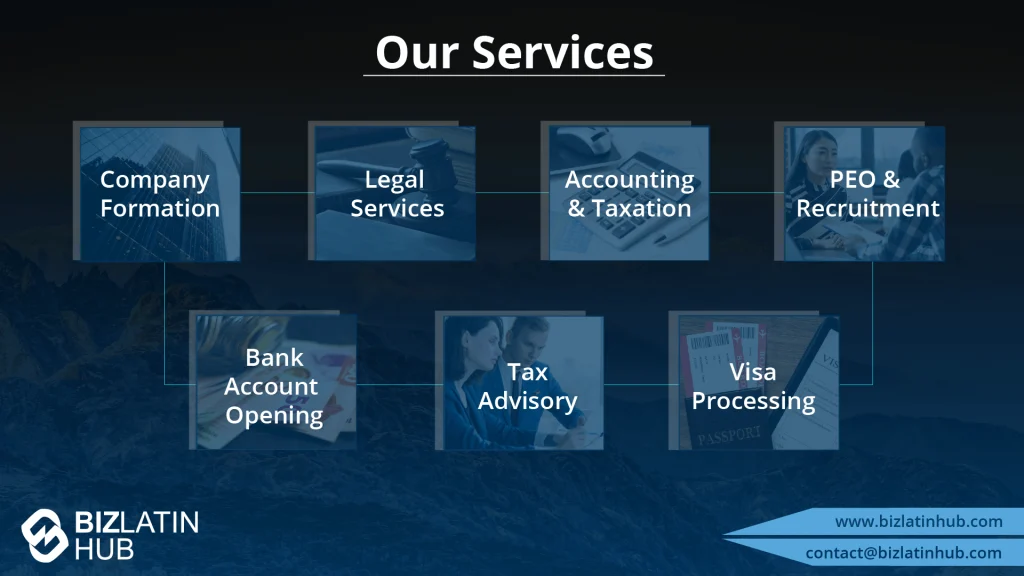Shipping companies and firms reliant on overseas goods were hoping that by 2023, global supply-chain issues would ease and some kind of normalcy would return. Unfortunately, the global supply chain “crisis” continues, and shows little sign of abating. This has led to a phenomenon known as “nearshoring,” and nowhere in the world has benefitted more than Latin America. In fact, nearshoring in Latin America could boost exports from the region by as much as $78 billion USD annually.
Of course, there is no one reason that explains the rise of nearshoring in Latin America. It all depends on the industry. For commodities-focused companies, the region represents a viable alternative for the purchase of fossil fuels in the wake of supply-chain bottlenecks and the disruption caused by Russia’s invasion of Ukraine. For technology-focused companies, the idea to register a business in Latin America makes sense, in terms of cultural affinity, English language proficiency and as a cost-cutting measure. The latter appears to be the most prominent; one survey by Deloitte found that 87 percent of IT businesses considered nearshoring in Latin America to cut costs.

Benefits of nearshoring in Latin America
- High return in investment
- Lower labor costs
- Cultural similarities
- Time-zone alignment
- Low risk to intellectual property
There are many other reasons why more companies, entrepreneurs and investors are taking the plunge into nearshoring in Latin America, but these are the factors that most people are talking about.
Let’s take a more detailed look at the above points.
Top 5 reasons to consider nearshoring in Latin America
1. High return in investment
Many businesses have chosen to outsource to the region seeking increased Return on Investment (ROI). While nearshoring in Latin America involves a cash-spend in the short term, if done with a firm management structure in place, the quality product that comes from Latin American employees/contract workers will save the business time and money, and yield a tidy ROI as a result.
2. Lower labor costs
Cost savings is at the heart of the nearshoring phenomenon. With a vast pool of IT/tech talent in the region, hiring a qualified and experienced Latin American software developer – who’s going to demand a lot less than his/her US counterpart – just makes good business sense.
For example, an entry-level software developer in the US can expect to receive a salary of about $80,000 USD per year, while a Chilean software developer doing the same job can expect to make around $35 million Chilean pesos per year (roughly $36,000 USD). That’s a cost savings of 45 percent.
3. Cultural similarities
All countries in the Americas share more than a land mass in common, but also a similar cultural background that makes it easier to integrate diverse nationalities into a team. This aids in a better understanding of the customer’s attitude while delivering the required outcomes. As a result, intercultural dialogue between US clients and Latin American human talent runs more smoothly, reducing any delays created by miscommunications.
4. Time zone alignment
Latin American workers have nearly identical working hours as their American or Canadian counterparts. Latin America shares a full overlap with North America, allowing up to eight hours of synchronous work. This facilitates team collaboration and eliminates any delays in project completion.
5. Low risk to intellectual property
If there’s anything that may give a company pause to engage in nearshoring in Latin America, it’s that sending intellectual property to a contractor in another country may make it vulnerable to ending up in the wrong hands. But many teams in countries like Mexico and Brazil have developed a better understanding of the IP laws of the US and know how to securely handle a company’s intellectual property.
SEE ALSO: Nearshoring in Latin America ‘could up exports by $78B’
There is little doubt about the benefits of nearshoring in Latin America, but it might not be clear to businesses how to “do nearshoring,” so to speak.

Nearshoring in Latin America: Is it the right move for your business?
There are a lot of decisions that need to be made prior to moving forward with nearshoring. Business leaders must ask themselves questions like:
- Is it hard to find human talent locally? – Is it worth making a move overseas because it’s expensive or difficult to find employees in your current location? If so, know that nearshoring in Latin America is a cost-cutting measure first and foremost. What’s more, finding a local partner to help with recruitment can save you months of recruiting/hiring headaches.
- Are you comfortable with digital project management? – Nearshoring relies heavily on digital connectivity. If your business depends on in-person communication, you may find the transition difficult to incorporate into your company culture.
- What is your overall goal? – Are you planning on hiring full-time Latin American employees, or does it make more sense to contract tech talent temporarily, on a per-project basis? This decision will likely influence which jurisdiction you choose to engage.
- Which jurisdiction should you choose? – When doing nearshoring in Latin America, it’s tempting to think of Mexico, as it’s the closest country to the US. Brazil is another popular nearshoring hotspot – and both have large pools of qualified software developers and engineers. But countries such as Chile, Colombia, Uruguay and Argentina are also seeing explosive growth in their pools of tech and other human talent, and the costs saving may be even greater in those countries.
Biz Latin Hub can help you with nearshoring in Latin America
At Biz Latin Hub, we provide integrated market entry and back-office services throughout Latin America and the Caribbean, with offices in Bogota and Cartagena, as well as over a dozen other major cities in the region. We also have trusted partners in many other markets.
Our unrivalled reach means we are ideally placed to support multi-jurisdiction market entries and cross border operations.
As well as knowledge about nearshoring in Latin America, our portfolio of services includes hiring & PEO accounting & taxation, company formation, bank account opening, and corporate legal services.
Contact us today to find out more about how we can assist you in finding top talent, or otherwise do business in Latin America and the Caribbean.
If this article on nearshoring in Latin America was of interest to you, check out the rest of our coverage of the region. Or read about our team and expert authors.






